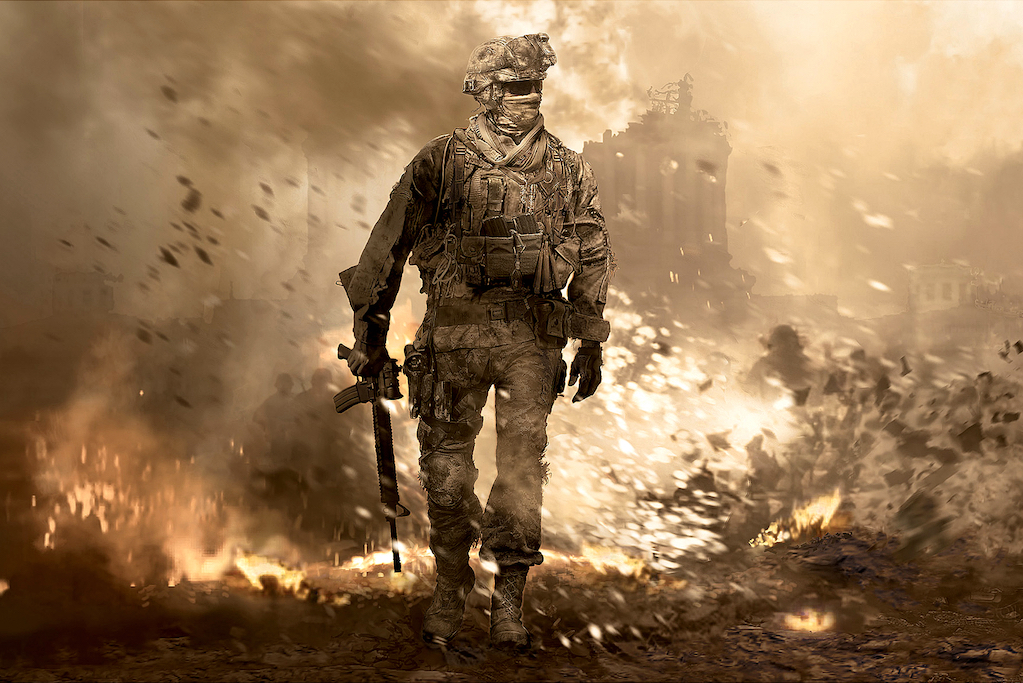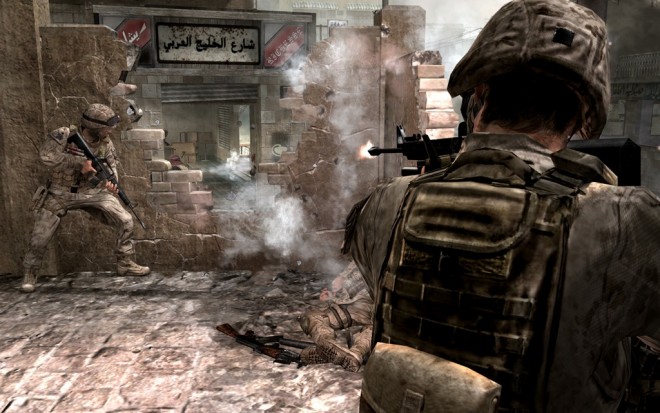From Nazis To Terrorists: Do Modern Shooter Games Have A Problem With “The Bad Guys”?
"There's an implicit message: these people are the enemy. They are different to me, and less than me. They’re expendable."

On September 11, 2001, not long after the first plane hit the World Trade Center’s South Tower, I emptied the clip of an AK-47 through a narrow crack in a door in a desperate bid for survival. Out of ammo, I switched to a handgun, got off two shots, copped a sniper round in the face, and died. As I peppered the air with expletives and waited to respawn, I noticed that other players and staff had begun to cluster around a tiny television in a corner of the cybercafe.
Counter-Strike started off in 1999 as a mod for Valve’s hugely successful sci-fi shooter Half-Life. In CS, players choose between two teams: terrorists and counter-terrorists. By 2001 my friends and I were taking it pretty seriously. We discussed tactics and timing, which guns to buy and where to throw a flashbang for maximum effect. We’d play on weekends, before class, even stopping off for a celebratory round after dinner on my 19th birthday. None of us gave the slightest thought to the roles we were playing, long into the night. Why would we? It was just a game. The two sides were differentiated by skill, position and available gear — not ideology.
The round ended with my team, the terrorists, winning. It meant more money to spend on guns and gear next turn. All I could see on the TV was a plume of smoke so I turned back to my monitor, clicking impatiently. Then the second plane hit the second tower, and nothing was ever the same.
Killing In The Name Of
Shooters are fun. They are kinetic and exhilarating in a way that few video games can be: there’s an electric thrill that comes from using your aim and reflexes to triumph in digital playgrounds. But most of them require a steady stream of cannon fodder, and the depiction of these expendable enemies can enter some murky territory — particularly when it comes to terrorism.
Take military shooters, for example. These are among the blockbusters of video games; triple-A titles with huge budgets and names so patriotic you can smell the gunpowder: Medal of Honor, Battlefield, Call of Duty. Each of these three franchises were originally set in World War II — to quote Quentin Tarantino, “the last time a whole bunch of white people fought a whole bunch of other white people”. They offered a chance to be awash in righteousness as you killed Nazi after Nazi after Nazi. You were saving the world, and every bullet was imbued with holy purpose.
As these franchises grew in popularity, so did their sprawl. Medal of Honor jumped from Omaha Beach on D-Day to Pearl Harbour to the invasion of Afghanistan in its eponymous 2010 reboot. Soon, military shooters outgrew real-life conflicts, and began dropping players into fictional situations with fictional antagonists: a standout is Battlefield 2’s Middle Eastern Coalition — an imaginary aggregation so lazy that it’s not really much of a step up from calling it the League of Brown Dudes. Saying the representation of other cultures in these games left much to be desired is a bit like saying the Grand Canyon is a large hole in the ground. But still, the player was righteous.
After three games set in the second World War, Call of Duty released Modern Warfare: a game that featured terrorism and US retaliation in a small, unnamed, oil-rich Middle Eastern country. Call of Duty: Modern Warfare 2 got slammed for a mission that had a US soldier infiltrating a terrorist cell, with the option to kill civilians in a crowded airport while undercover. The player is never explicitly instructed to open fire, but it’s hard not to play along — in the game’s world, it’s what the terrorists would do.
PC gaming site Rock Paper Shotgun described how the Call of Duty series went off the rails, pointing out that while early instalments consulted veterans on the horrors they endured, later games spoke to current members of the military who dealt primarily in patriotism and bravado: “As a result, the games became unwitting propaganda, gung-ho demonstrations of a nation’s power over the inferior upstarts. Things had changed from the miraculous successes of scrappy, ill-prepared teenage troops, to giants with magic buttons crushing poor brown people.” By February last year, the series had sold more than 250 million copies around the world.
Most shooters provide a moderately heroic reason for the player to kill — to save the world, to rescue a loved one, to right a wrong. The price of obtaining these goals is, more often than not, a truly ridiculous body count, which is rarely (if ever) discussed in the game’s internal narrative.
This clash between a game’s aims and the way they are attained via gameplay is called ludonarrative dissonance. Most of the time, military shooters get around this by placing you in uniform. The body counts are still off the charts, but it doesn’t matter; you’re doing a bad thing to bad people to protect all that is good. There’s no ludonarrative dissonance because you aren’t fighting for yourself; you’re fighting, more often than not, for the USA, the country which produced the bulk of these games.
There are enough shooters out there, and enough real-life conflicts, that other points of view and other nationalities do occasionally get represented on-screen; Battlefield 1, set in WWI, is a good example. But having US soldiers as the enemy is rare enough that the odd game that does it is still dramatically unsettling, such as the Apocalypse Now-riffing of Spec Ops: The Line. It’s wrong to hear those voices, those accents, crying out in fear and pain. Or so we have been taught, over and over again.
Planet Terror
It seems like there’s always been someone on a soapbox arcing up about the dangers of video games. But the academic community is relatively divided. The closes thing to consensus is that, while children with violent tendencies may be drawn to violent games, it doesn’t look like playing video games actually causes violent behaviour.
So while there’s nothing wrong with enjoying a shooter, it’s vital to be mindful of forced perspective and latent propaganda. There’s something terribly wrong when, over the course of a franchise, someone playing a shooter goes from killing Nazis to killing various brown-skinned enemies in fictional conflicts. Representation matters, as does negative representation. Few people that spend hours in a game, killing hordes of Islamist enemies, will go out and kill Muslims in real life. But it’s much more likely that they’ll take away the message implicit in so much of this digital tribalism: that these people are the enemy. They are different to me, and less than me. They’re expendable.

While it’s problematic that “terrorist” becomes shorthand for “bad guy” in military shooters, it’s remarkable how many other video games cheerfully cast the player in these roles — and have them engage in activities — that look a lot like terrorism. As New Republic points out, there are still games where you are “dropped into countries, often fictional, though not always, and tasked with blowing up infrastructure, killing soldiers, assassinating people, stealing things and toppling the regime”.
The dichotomy is as bizarre as it is fascinating — in some games you battle bad guys, or terrorists. In others, you sow panic and use deadly force to avenge loved ones or destroy corrupt governments. Enemies in these games — such as the Arkham series of Batman games, or Dishonored and its sequel — don’t remain static; as you progress, they start to react to your actions. People in the game aren’t just terrified, they’re terrified of you, and it’s a powerful feeling.
Sometimes I think about these things while I’m playing video games — and sometimes I think of the panic and dread caused by intolerance running rampant in the White House, and the way Australian politicians’ rhetoric around immigration has metastasised into fear-mongering and xenophobia. I think about playing Counter-Strike, all those years ago. And I think about how being a terrorist is sometimes simply a matter of which side you’re on.
–
Hari Raj has worked as a journalist and editor in Malaysia, China, and Australia. He tweets about pop-culture ephemera at @jarirah.
